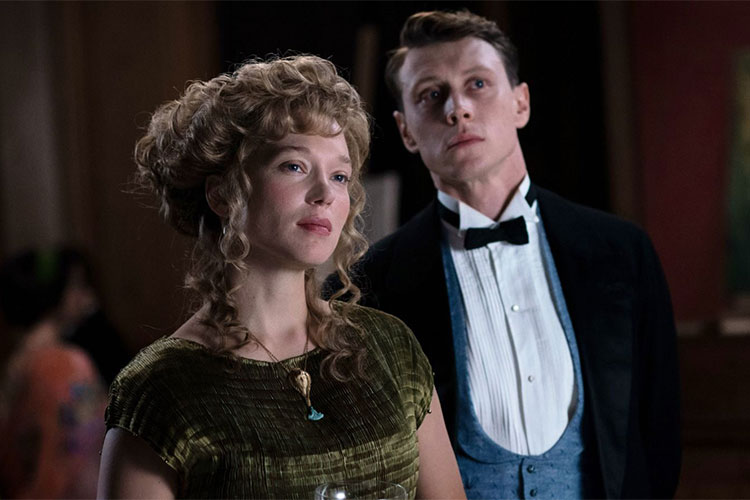The following questions and answers are excerpted from a conversation that followed the NBR screening of The Beast.
I heard that your first idea, or one of the first images that you had, was the green screen prologue. Why was that the right way to start the film?
Bertrand Bonello: It’s the first thing I wrote. Because for everyone, or for every audience, green screen is related to the idea of virtuality. And so at the beginning, the audience knows that not everything would be real. There would be some virtuality in the film. If you enter directly into the 1910 part, for example, it looks like a period film. If you have the green screen first, you know it’s going to be a little more twisted. The second reason is whatever the story is, you have Léa Seydoux like for three minutes alone in this green ocean, and it’s a way to say, “my subject is her,” you know, besides the story. And also, as in this scene, you have an element of me as the director talking and saying, “okay, are you ready?”
You are really entering the subject and when you enter the scene after that, the long, long scene in the party in 1910, you enter it loaded with something.
it’s more and more difficult for me to find films that bring me a cinematic experience
Even though you’re changing formats and you’re shooting different aspect ratios, you managed to keep it so cohesive as a whole. How did you accomplish this?
BB: Well, the decision was to say, “okay, the present of the film is 2044, and it’s going to be a square ratio, 1.33, because it’s meant to take away space, in a way, you know. And to make it so that the characters are a little more trapped. Then when you go back to the past, you open it up. Like if the past was a refuge or a movie, you know. So you go back to 1.85. And inside that, the 1910 part is shot in 35mm, because we needed this kind of sensual texture. And 2014 and 2044, the digital and the sharpness and coldness of digital were perfect.
Did you sense that there was a difference, because of those different camera techniques, when shooting those scenes with the actors?
BB: Well, I really started my career on film, you know. So when I switched to digital with Nocturama, I didn’t change my way of shooting. I still do like three or four takes, not more than that. It’s not like I let the camera run. And so for me it doesn’t change a lot. Thing is, for the crew, I realized that when it’s 35mm, everyone is a little more concentrated. When you say, “I’m ready,” everyone’s ready. You know, it’s not like you do one shot and afterward you say, “ah, I’m going to add a mic,” or stuff like that. They don’t do that. So, and even for the actors, it’s good for concentration because everyone knows it costs money.
How much did you talk to your actors about how you were going to shoot it? How much do you discuss things like production or themes with them beforehand?
BB: You cannot imagine a bigger difference in approach between two actors than the one between George and Léa. George, for example, I mean he is someone that really needs and wants a lot of explanations and prep and stuff like that. So like, I don’t know, two months before the shoot, we had huge exchanges of emails and he wanted to be sure of everything. Like if I enter the room at that moment… do I do it this way or that way? In this line I have, does this word mean that or that? Do you have only one meaning or underneath meaning? You know, he wants everything. Then he disappears and works on his own. And Léa, to the contrary, she doesn’t want to know anything. Well, she’s, I think she’s a little scared of intellectualization, you know. She likes to arrive on the set and, you know, sometimes she doesn’t know even what we’re going to shoot. So I just explain to her the heart of the scene, and just before I say action, I say like three or four words, you know, just to put her in the mood. And usually it works. She likes to discover the scene while she’s acting. And when it doesn’t work, she comes to me and says, “Okay, anyway, Gabrielle, she’s your character. You know her much better than I do. Just do the scene for me and I will imitate you.” So that’s what I do.
I’m fascinated about the way that you use melodrama in a world that you’re creating that’s emotionless. Is it a fear of yours that maybe cinema also is becoming a little emotionless?
BB: Yes, more and more. I’m going to talk a bit more about French cinema, but more and more people are obsessed with the subject of films, much more than the films. And I don’t really care about the subject of films. I’m interested in movie experiences, you know? And about who is doing the film, much more than what the film is, you know? Do I have, like, an experience as a spectator? Is it a real story? So, it’s a big movement, this, this this way. That just, that scares me, but it’s more and more difficult for me to find films that bring me a cinematic experience.

